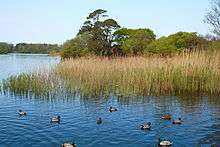Lough Leane
| Lough Leane | |
|---|---|
.jpg) | |
| Location | Killarney, County Kerry |
| Coordinates | 52°2′30″N 9°33′0″W / 52.04167°N 9.55000°WCoordinates: 52°2′30″N 9°33′0″W / 52.04167°N 9.55000°W |
| Basin countries | Ireland |
| Surface area | 4,700 acres (19 km2) |
| Islands | Innisfallen Island |
Lough Leane (from Irish Loch Léin, meaning 'lake of learning') is largest of the three lakes of Killarney. The River Laune flows from the lake into the Dingle Bay to the northwest.
Etymology and history
The lake's name means "lake of learning" probably in reference to the monastery on Innisfallen, an island in the lake. Innisfallen was a centre of scholarship in the early Middle Ages, producing the Annals of Innisfallen and, according to legend, educating King Brian Boru.
Another historic site, the tower house Ross Castle sits on Ross Island in the lake. Ross Island is rich in copper. Archaeological evidence suggests the island has been mined since the time of the Bronze Age Beaker People.[1][2]
Geography

Lough Leane is approximately 19 square kilometres (4,700 acres) in size.[3] It is also the largest body of fresh water in the region.[4] It has become eutrophic as a result of phosphates from agricultural and domestic pollution entering Lough Leane Reedbed, an important habitat on the edge of Lough Leane. This nutrient enrichment has caused several algal blooms in recent years. The blooms have not yet had a severe effect on the lake's ecosystem. To prevent further pollution causing a permanent change in the lake's ecosystem, a review of land use in the catchment area is being carried out.[3] Water quality in the lake appears to have improved since phosphates were removed from sewage in 1985.[5] As of August 2007, several large hotels and businesses have stated their intention to stop using phosphate detergents, in an effort to preserve the quality of the lake water. Lake cruises for tourists leave from Ross Castle, and boats can be hired for the trip to Innisfallen Island.
See also
- Eóganacht Locha Léin, a ruling sept in the area during the Middle Ages
References
- ↑ "Ross Island". nuigalway.ie. Retrieved 2014-04-11.
- ↑ J. P. N. Northover, W. O'Brien and S. Stos. "Lead Isotopes and Metal Circulation In Beaker/Early Bronze Age Ireland." The Journal of Irish Archaeology Vol. 10, (2001), pp. 25-47. Wordwell Ltd. Stable URL: http://www.jstor.org/stable/30001669
- 1 2 Dúchas. "The Lakes". Archived from the original on 2007-06-15. Retrieved 2007-07-01.
- ↑ The Department of the Environment and Local Government. "Living with Nature: The Designation of Nature Conservation Sites in Ireland" (PDF). Retrieved 2007-07-01.
- ↑ National Parks and Wildlife Service (2005-12-05). "Killarney National Park, Macgillycuddy's Reeks and Caragh River Catchment Site Synopsis" (PDF). Archived from the original (PDF) on 2007-11-19. Retrieved 2007-07-01.